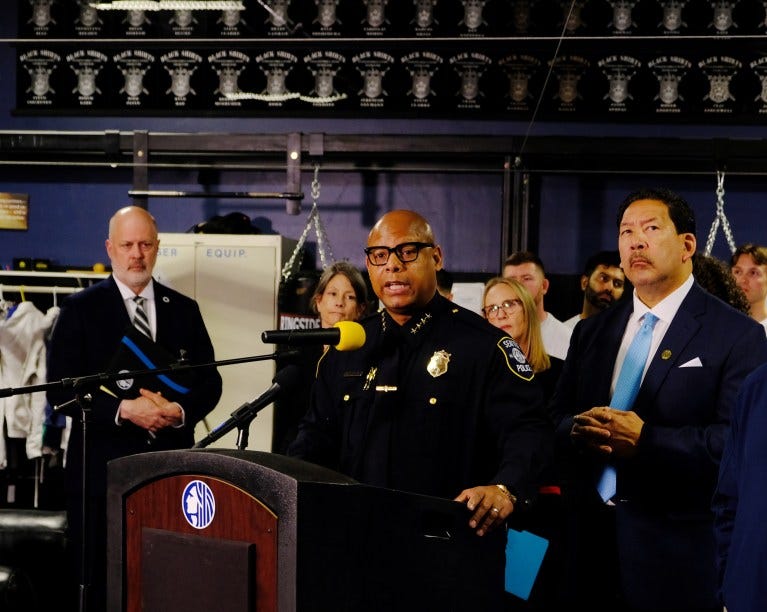SPD Celebrates Its Hiring Spree. The Only Thing That's Missing: Women.
So far this year, the city has hired just five female officers, out of 60 new recruits.
By Erica C. Barnett
Mayor Bruce Harrell and acting Police Chief Shon Barnes touted SPD's latest hiring numbers on Monday. Standing in a gym at SPD's training facility in Georgetown, the two men stood in front of by 15 members of the Seattle Police Department recruit class of 2025—a group of people Harrell said "truly represent our community."
One thing was notably absent in the backdrop of new recruits: Women. SPD, which is facing multiple lawsuits from women alleging gender discrimination and harassment, has frequently said that recruiting more women is a top priority, but the department has not announced any specific efforts to improve the department's well-documented culture of misogyny.
In 2021, SPD signed the "30 by 30" pledge, committing to have a 30 percent female recruit class by 2030.
To say they've failed to make progress is an understatement. Last year, SPD only managed to hire 12 women—just 14 percent of its 84 new hires. This year, that figure has dropped to just eight percent—an abysmal five women out of 60 officers hired so far this year.
Perhaps it's unsurprising that a city so hyperfocused on increasing the number of bodies in police uniforms has failed to register alarm that almost all those new bodies are male. If your whole pitch for SPD is that you can make six figures and get a hiring bonus, you probably aren't going to reach people who aren't considering a job in law enforcement in the first place, particularly those who have heard about SPD's reputation as a place where women get harassed and overlooked.
Still, it was a bit of a visual jump-scare to walk into SPD's training facility and see that the city had chosen a phalanx of preternaturally buff young men to serve as the visual backdrop for their big hiring announcement. (One young woman became visible in the back of the group partway through the press conference.)
I asked Barnes—who received wide praise in Seattle for maintaining a better gender breakdown at the Madison, WI police, where he was chief before coming to Seattle—what the department was doing to address its male-dominated culture and proactively recruit more women. (Barnes had just finished telling three brief anecdotes in which various men expressed an interest in becoming a Seattle police officer to him personally).
"I looked at those numbers, and those numbers are not exceeding my expectations," Barnes said. "Last year we hired 10 females," he continued, misspeaking slightly. "This year we have five. So we still have some work to do on that."
"Maureen McGaugh"—the founder of 30 By 30— "is a close personal friend of mine," Barnes continued. "And so I had a conversation this morning with staff about making sure that we give a second look to any female applicant before we give them a rejection letter—like, what's going on there?"
"But you know, a lot of police departments struggle with" hiring women, Barnes said. "I think for me, it's making sure that any applicant, no matter your demographics, you know that Seattle Police Department has a place for you."
Overall, the 60 new hires represent a net increase of 36 officers, after factoring in 24 departures so far this year.
The police department remains by far the biggest portion of the city's general fund budget. On Monday, Harrell said he would consider the new option of a 0.1 percent sales tax for public safety that the state legislature approved last week, using public safety as the "lens by which we will make decisions" on the upcoming budget. "That doesn't mean that housing and child care and education and other climate change, the other strong components of our ecosystem, are not important," Harrell said. But, he added, "we have to center public safety to make sure that our kids are safe."
The local-option tax has to be spent on criminal justice, but the legislation adopts an expansive definition of that term that includes diversion, public defense, and prevention programs, which King County Councilmember Girmay Zahilay said he would want to fund, in addition to more prosecutors and cops, if the county passes their own version of the tax.
The city is facing a projected budget shortfall of $241 million over the next two years, on top of previous budget forecasts that showed growing deficits starting in 2026. Thanks to the council's actions last year, the JumpStart tax, originally dedicated to four specific spending categories, is now an all-purpose bucket of money the city can slosh into the general fund at will, but the council may soon have to reckon with the volatility of a tax that depends overwhelmingly on fewer than a dozen companies.







how many females applied compared to last year?